#so it's entirely possible that peter will read the initials upside down and think it's the wrong person
Explore tagged Tumblr posts
Text
i feel like there is so much miscommunication/misunderstanding shenanigans that can happen since wade and matt have the same initials but just flipped upside down
#like peter is a dumbass (lovingly)#and so are the other two#so it's entirely possible that peter will read the initials upside down and think it's the wrong person#or fancy lawyer matt has a stamp with his initials bc he's a dweeb#and he sends something to peter referring to him by his name#and stamps it upside bc he's a dumbass#and so peter proceeds to freak bc why does dp know his identity#i literally cant think of a specific scenario to fit this#but just the thought of peter seeing something with their initials#but he's hanging upside down when he read it so he gets the initials wrong#idk i feel like it would happen#idk how or why or when#but it's entirely likely#team red#wade wilson#deadpool#peter parker#spiderman#matt murdock#daredevil#spideypool#spideydevil#spiderdevil
48 notes
·
View notes
Text
No Puppet Strings Can Hold Me Down (9/?)
The Magnus Archives fanfic. An AU that diverges from canon between episodes 159 and 160, in which Peter Lukas’ statement that “he got you” takes on a different meaning.
on AO3
Breakfast... dinner... brinner was quiet and uneventful, after that. It would be easy to assume that it was meant to be a comfortable silence, that they had said all the things that really mattered back in the Lonely, but was that really true, or was there more to it than that? Jon thought it was the latter. Or perhaps Jon simply hoped it was the latter, hoped that this silence might be a sign that Martin knew more than he was sharing and didn’t much care to make small talk with Jonah Magnus regardless of whose body he was wearing. It was hard to tell for sure.
After they both were done, though, the silence got heavier. There was no clear activity for them to do next, after all. There was only them, them and an unkempt but cozy safehouse and time that needed to be spent within it or around it until they needed food or sleep once more.
Jon had dreamed of a life filled with nothing but leisure time like that, once.
Jon had dreamed of an awful lot of things that seemed to be coming true now in the worst way possible, like his subconscious had gotten hold of a monkey’s paw and milked it for all it was worth.
Martin was the one to finally break the silence between them. “Are you good now?”
Jon felt his face wrinkle and contort in a semblance of confusion. “That’s an awfully broad question. What do you mean?”
Martin hesitated, blinking a few times before responding. “I just meant, er...” His voice trailed off a bit as he looked pointedly at one of the stray piles of newly-brought belongings strewn across the place, though what made that particular pile special Jon couldn’t tell at a glance. “You’re not still hungry?”
“Martin, we just ate.”
“Not- not that kind of hungry.” Another semi-furtive glance directed towards the same pile of unorganized necessities. “Just, you know, I brought them along for you and all, but I don’t know how often you, well, need one-”
Jon put together the pieces a moment before Martin made his meaning even more plain, though Jonah just raised his eyebrow in response.
“The, the statements. Do you need to go read a statement, Jon?”
Even though he knew he had no control over the actual response to Martin’s question, Jon thought about what his response would be just the same. He’d started to practically take the statement reading for granted, these past few months, which probably wasn’t a great sign in hindsight; honestly, he’d grown better at tending to that need than making sure he ate actual food, if only because he’d learned the hard way what happened when that sort of hunger went unchecked. Now that he thought about it, though, he felt fine, at least physically. No hunger, no weakness, none of the symptoms he’d once mistaken for an illness before he’d known better.
Had it just not been long enough since the last statement for it to set in, or was his current situation enough to override that need, at least for the time being?
Jon’s train of thought was unexpectedly derailed by the sound of his own voice speaking up.
“I suppose it wouldn’t hurt.”
“Alright, well, they’re all ready for you. Got a bunch over there-” Martin waved a hand in the direction of the pile he’d been staring at before. “-though I didn’t look too close at what I was grabbing, they might be ones you’ve read already, or, or even fake ones, I don’t know-”
“I’m sure it will be just fine. Thank you, Martin.” Jon felt his lips curl into a smile he didn’t really feel.
“Don’t mention it. Just, er, while you’re busy with that...” Martin scratched the back of his neck nervously. “Mind if I take a nap?”
A brief moment of hesitation, in which Martin’s face grew more and more pink by the second.
“Not that I don’t like hearing you monologue, but I figure hey, if the bed’s not being used...”
“Oh, of course. Go right ahead.”
“Thanks.”
Martin went off to curl up in the bed, and Jon hoped that he slept well, that maybe they could keep making arrangements like this so Martin could at least spend some time sleeping somewhere more comfortable and height-appropriate than the sofa.
Jon couldn’t tell if Jonah was looking for something specific in the statements, but he did glance at a couple before deciding on one and pulling it out from the stack, giving Jon a bit of a paper cut in the process, though he knew from experience the sting wouldn’t last and the cut would likely be gone in minutes if not seconds. A small blessing, there, one minor upside of an otherwise horrible situation. Lose your humanity, heal faster from paper cuts. Not Jon’s idea of an ideal trade-off.
“Statement of Isaac Kaufmann, regarding the aftermath of an attempted mugging. Original statement given August 13th, 2009. Audio recording by Jonathan Sims, the Archivist. Statement begins...”
It was a bizarre feeling for Jon, reading out loud a statement without being drawn into it, going through the motions without any of the emotions he usually associated with the act. He felt bad for the guy, sure, but that was just basic human sympathy (or basic inhuman sympathy perhaps), not literally feeling everything this Mr. Kaufmann felt upon almost being mugged and surviving only by way of encountering something stranger and no less dangerous than the man who had tried to mug him initially. Jon had wondered from time to time how odd his reading statements must look from an outside perspective; now, it seemed, he was as close to getting an answer to that question as he was likely ever to get.
The words pouring out of his mouth sounded like a passable imitation of his usual statement voice, at least, and if Jonah faltered once or twice, well, Martin wasn’t exactly hanging on his every word, napping as he was in the cabin’s lone bed...
Though that gave Jon an idea.
Jon couldn’t do much now, but he could still Know things--he’d learned that already, had done it without even trying to back in the car.
When he’d tried too hard to Know what Peter Lukas was planning some time ago, he’d made himself sick, even blacked out for a moment afterwards before getting what had to be the supernatural equivalent of the world’s worst hangover.
What would happen, then, if he tried to Know what Jonah Magnus was planning now?
At best, he’d get some answers, know exactly what was in store for him, though Jon wasn’t holding his breath on getting the best possible outcome here; life never seemed to be that generous towards him.
Maybe it’d do to his body what it’d done before, disorientate him, weaken him, and weakening him meant weakening Jonah Magnus now, so that was a price Jon was very much willing to pay.
At worst... well. Not much could be worse than the present scenario. Worst case would likely be his attempt at Knowing failing utterly, and Jon still would know nothing and Jonah Magnus would still be running around unhindered in his body, and it still wouldn’t actually be any worse than if he hadn’t tried at all.
Jon didn’t hesitate.
What is Jonah Magnus’ plan?
The information poured into Jon’s mind all at once.
Ignaz Semmelweis, the first doctor to successfully prevent most postpartum infections by encouraging doctors to wash their hands, was roundly ignored by his contemporaries and died in obscurity. The tallest body Jonah Magnus has ever inhabited, one by the name of Mark Matthews, stood at six feet, three inches tall. The Admiral has a half-sister that lives nine blocks away from Georgie’s flat. Hydrophobia is a historic name for the disease of rabies due to late-stage symptoms in which the infected person cannot swallow liquids, cannot quench their thirst, and shows fear or panic when presented with liquids to drink. Liz Culvert, who dated Elias Bouchard when both were attending uni, wrote a short poem about Elias’ eyes while they were dating. The rhyme “Red touch yellow, kills a fellow; red touch black, friend of Jack” does successfully distinguish between venomous coral snakes and nonvenomous scarlet king snakes, but is only entirely accurate when applied to snake species native to the southeastern United States...
The information keeps coming rapid-fire, the details of each seemingly-random factoid soon blurring together in Jon’s mind, his senses overpowered by the sheer weight of Knowledge within his head. The world faded away, replaced by static and words, and still the information kept coming and there was nothing he could do about it-
The next thing Jon knew (lower-case), he was sprawled out on the floor, head pounding, back smarting, every part of him hurting like hell--still unable to move a muscle of his own accord, though he did give it a try just in case--and the only good thing Jon could think of was that Jonah Magnus must be feeling this pain as acutely as he was.
If he had actually learned anything about Jonah Magnus’ current plans it was lost to him now, a drop within a sea of more or less useless information, a needle buried deep within a haystack.
Did Jonah Magnus feel as disoriented as Jon did? The only way to know for sure was to engage him in conversation, Jon supposed, but... he’d rather pass on that, thanks, especially since that’d probably manage to make his headache even worse somehow.
His hands were shaking as he sat up, though, and as Jon wasn’t the one controlling them, wasn’t the one in charge of their shaking or lack thereof, he figured that meant his little stunt must have had some effect on his mental captor.
“Jon?”
Jon looked over as Martin rushed over to his side. Jon had assumed that Martin wouldn’t have noticed any results of what he’d done, that he’d be too lost in sleep to wake up for something so relatively minor, but evidently that assumption had been a faulty one.
“Jon, what happened? Are you alright?”
Jon tried not to read too much into the questions Martin asked, tried not to search them for even the slightest signs of understanding, but to no avail. He’d thought that he’d given up on false, useless hope already, and yet...
“I’m fine, don’t worry. Just a... a bit of a dizzy spell, I suppose.”
“Do you know what brought it on? You didn’t hit your head on the way down, did you?”
“I don’t believe so, no. And... hard to say. I didn’t wake you, did I?”
As Martin looked down at Jon, a hint of a smile crept onto his face. “No, no, I couldn’t sleep anyway. Wasn’t your doing. Now, d’you need a hand up?”
“Er...”
“Sounds like a yes to me.”
Martin extended his hand, and Jonah took it for him, and Martin was still cold to the touch but his manner was still warm as anything, and it didn’t matter what temperature his hand was, just that it was big and soft and embracing Jon’s own hand in turn, supporting him both physically and metaphorically a-
Don’t try to pull that little stunt again.
And Jon’s train of thought was disrupted in the most awkward of fashions by Jonah Magnus’ butting in just before Martin released his grip as Jon stood upright once more.
His arms were still shaking, though, and Jon doubted that Jonah was putting that on for show, not when his head still ached from too much knowledge filling it all at once.
So he could do something, then. He could do at least one thing that would affect the world around him, not just the worlds within his own mind. Granted, that thing was basically eldritch self-sabotage, but it was something at least. That had to be a good sign. That had to be better than nothing.
And if Jonah Magnus was warning him against it, that meant that Jon now had some form of leverage against him, something he could threaten Jonah with that was clearer and more tangible than any of Jonah’s own vague yet ominous threats.
Jonah said something to Martin, but Jon didn’t hear it, busy as he was laughing to himself, hoping that his laughter would be loud enough for Jonah Magnus to hear.
#tma#tma au#tma fic#tma fanfic#the magnus archives#the magnus archives au#the magnus archives fic#the magnus archives fanfic#personal#my writing
6 notes
·
View notes
Text
Luxury Hotel Company Is Biggest Beneficiary of Small-Business Funds

Hotels, luxury resorts and management companies that funnel money back to a single company have secured about $53 million in federal virus aid, the largest known amount to benefit one firm and the latest example of how the government’s small business relief program is also helping big companies.Ashford Inc., an asset management firm based in Dallas, makes money partly by advising two real estate investment trusts: Ashford Hospitality Trust and Braemar Hotels & Resorts, which together own more than 100 properties. Those companies reported in public filings that their hotels had received millions in forgivable loans through a government program meant to help small businesses. The so-called Paycheck Protection Program ran out of its initial $349 billion on April 16, leaving many small companies with no assistance.Congress is expected to add another $310 billion to the program, but there are growing concerns that the Treasury Department and the Small Business Administration have not done enough to prevent big companies from getting funds ahead of smaller, often independent businesses with no other financing options.Several other big, publicly traded companies have received forgivable loans, including J. Alexander’s, whose restaurants received $15 million; Ruth’s Hospitality Group, parent to Ruth’s Chris Steakhouse; and Shake Shack, which has since returned the loan. That has prompted an outcry from lawmakers and small-business owners, who say this goes against the intent of the program.Treasury Secretary Steven Mnuchin said his department would be issuing new guidelines on Wednesday that would tighten the rules for which types of companies could get forgivable loans, potentially restricting publicly trade companies from accessing the relief funds.Mr. Mnuchin, who said this week that the program was not intended to aid big companies that have access to capital, urged firms that received loans to return the money if they did not meet the eligibility requirements. If they did not, he said, the loan would not be forgiven and those firms could face “severe consequences.”“If they pay the money back quickly, there will be no liability to Treasury and the S.B.A.,” he said. “If they don’t, they could be subject to investigation.”Ashford Hospitality’s affiliated hotels received $29 million of the $31.1 million they had requested as of mid-April, according to its financial filing. The biggest chunk of money went to the Ritz Carlton Atlanta and a Sheraton in Anchorage, Ala., In all, 42 properties from Manhattan Beach, Calif., to Plano, Tex., were listed as recipients of aid.Braemar Hotels & Resorts had already secured $10.6 million across its subsidiary properties as of its April 15 financial filing, and was hoping for $15.8 million in total. Both of the trusts received their loans through Key Bank.Ashford Inc.’s most recent filing shows that its direct subsidiaries, which include the management company that runs many of Ashford Hospitality Trust’s properties, secured an additional $12.8 million in funding. Together, the funds make the company the single-largest beneficiary of the small-business program, based on disclosures to date.“We are grateful for the crisis assistance made available by Congress for our industry, and will use every dollar possible to bring our employees back to work,” Montgomery Bennett, founder and chairman of Ashford Inc., said in an emailed comment.Mr. Bennett has been publicly bemoaning the government’s coronavirus response in recent weeks, telling CBS News that he had cut 95 percent of his staff and worried the aid would be insufficient.The two real estate investment trusts own hotel properties that they pay management companies to operate. If quarantines and travel shutdowns keep guests away, it could leave the REITs without much income, which they need to service their debt. By helping hotels keep up with costs, the small-business loans could help to offset that problem.The loans will also help hotel workers continue to draw paychecks even as occupancy rates plummet. And they could serve as a lifeline for the REITs and their subsidiaries.Ashford Hospitality Trust, whose subsidiaries are getting the most in loans, had already run into trouble amid the coronavirus crisis. Its stock had lost about 74 percent of its value since the start of February, and closed Tuesday at $0.63 per share. As recently as last May, it was valued at $5.60.The two trusts are especially poorly placed for the upheaval caused by coronavirus because both are heavily indebted compared to their peers, based on metrics compiled by Bloomberg.In its recent annual filing, Ashford Hospitality Trust noted that it had more debt on one portfolio of its hotels than the businesses were worth. Those properties include several that received paycheck protection loans, including the Hampton Inn Pittsburgh Waterfront and the Courtyard Wichita in Kansas.“High leverage in this kind of environment — that’s the kind of situation that can bring companies down,” Jeffrey Langbaum, senior REIT analyst at Bloomberg Intelligence, said about the industry. “The entire lodging space is just getting hammered, as you’d expect.”Even amid its 2019 troubles, Ashford Trust paid an Ashford Inc. subsidiary tens of millions in advisory fees, based on its annual filing.Other publicly traded REITs managed to tap the Payroll Protection Program. Lodging Fund REIT III acquired $286,100 in loans for its subsidiaries through Western State Bank.REITs, as an industry have been looking for more help. Thomas Barrack, a prominent investor and ally of President Trump’s, has warned of a catastrophic collapse as loans suddenly decline in value.The optics of giving money to a big company may be bad, economists say, but doing so will help more workers keep their jobs.“The biggest problem with the P.P.P. is not that it was generous, it’s that Congress gave it too little money,” said Ernie Tedeschi, an economist at Evercore ISI who has tracked the program’s spending. “That made the rivalry for those scarce funds intense, and so in the end, it’s little surprise that large, well-connected companies were able to beat out small businesses in many cases.”That is particularly true for the hospitality industry, which has been among the hardest hit by the virus.“To have their loans waived under the program, businesses need to maintain their staffing levels,” said Steven Hamilton, an economist at George Washington University who was an early supporter of congressional assistance to small business amid the crisis. “So if these businesses are in financial distress, which is surely the case for the hotel industry, the upside is that their workers will keep their jobs.”The bipartisan group of lawmakers that drafted the P.P.P. initially modeled it on a Small Business Administration loan program for companies with up to 500 employees, called 7(a) loans.As they negotiated a final agreement, Senator Marco Rubio, Republican of Florida and the chairman of the small-business committee, and several of his colleagues from both parties, including Senator Chuck Schumer of New York, the Democratic leader, agreed to expand the eligibility requirements for the program for some hospitality establishments.Restaurant and hotel groups qualified if their individual locations each had fewer than 500 workers — even if their total payrolls exceed that number. That allowed more employers to gain access to the loans, a move that had been pushed by lobbyists for hotel and restaurant associations.The program had done “pretty darn well” at reaching small businesses, the chairman of the National Economic Council, Larry Kudlow, said on CNBC on Wednesday when asked about loans going to larger businesses.“I know there have been controversial cases,” Mr. Kudlow said. “Programs like this, gigantic programs like this put together quickly will always have glitches. But really, in the main, I think the process worked very, very well.”Peter Eavis contributed reporting. Read the full article
#1augustnews#247news#5g570newspaper#660closings#702news#8paradesouth#911fox#abc90seconds#adamuzialkodaily#atoactivitystatement#atobenchmarks#atocodes#atocontact#atoportal#atoportaltaxreturn#attnews#bbnews#bbcnews#bbcpresenters#Beneficiary#bigcrossword#bigmoney#bigwxiaomi#Biggest#bloomberg8001zürich#bmbargainsnews#business#business0balancetransfer#business0062#business0062conestoga
0 notes
Text
03: Underworld and Death in London
Short summary:
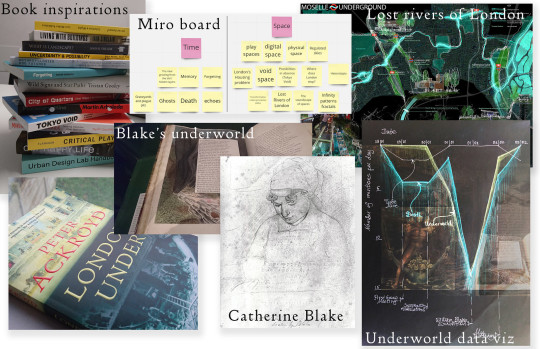
Our first group ideation sessions:
Abandoned and hidden spaces
Underground and graveyards
Hidden London
Time and space
London's lost rivers - my previous study of the lost river Moselle
The interdependence of the designer and their subject:
Traditional HCI approach tries to eliminate designer bias
Is it possible to embrace it instead? What is to be gained by doing so?
The 'task-artifact cycle': we are changed by the technology as much as it is changed by us
How can the new layer of smart city technology slot into the existing historic context of London?
Critical fabulations:
“What histories of practice have been suppressed or elided? What voices are missing?”
William Blake exhibition:
The themes of underworld and death
The absent narrative of Blake’s wife, Catherine
Read more:
Since my previous post, my group and I have met twice, ideating on the subject to choose for our collective smart cities project. The first session featured an enormous stack of books and an equally enormous variety of potential subjects: power dynamics, nature and the city, urban animals were just some of the overarching themes we discussed. Even though our smart city could be located anywhere, we were fast zooming in on London, not just due to its familiarity and easy access, but also because London offered us incredible opportunities in terms of its complexity and contextual richness.
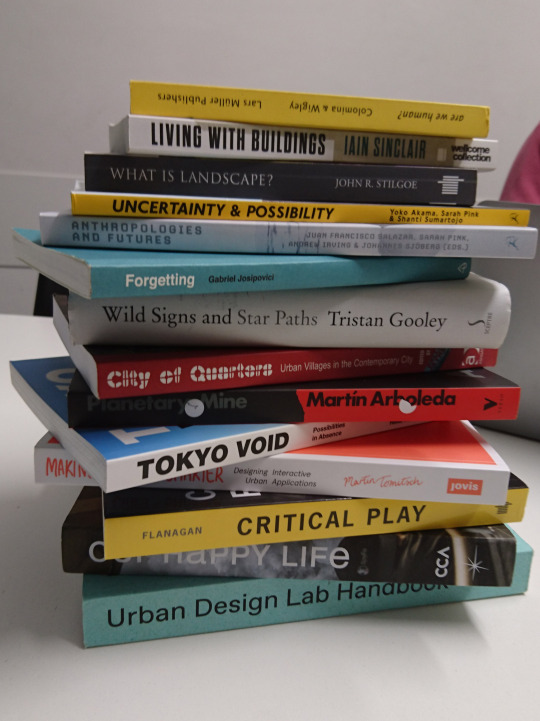
Image: A photograph of the books our group discussed at our first ideation session
The subjects that I found the most appealing involved abandoned and hidden spaces, especially ones with darker undertones. True to the spirit of my first blog post, I talked with passion about London’s underground graveyards and about the fact that here in this city, you never quite know what’s under your feet. The image below shows a snippet of our group Miro board showing the theme of time - where plague pits, memory and death have all found their home.
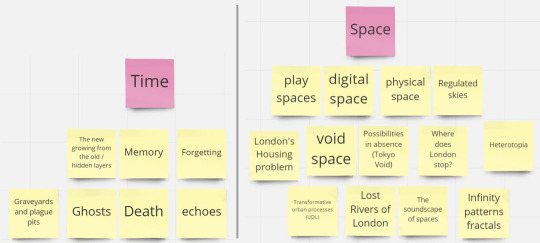
Image: A snippet of our group Miro board
Another prominent theme was space, our group’s chosen umbrella term for an array of possibilities from regulated skies to underground rivers. The latter are a special interest of mine - I have done a project on north London’s lost river Moselle some years ago. While doing research on it back in the day, I discovered that Moselle used to flow directly underneath the street I lived on at the time, in Crouch End. I remember wondering how my neighbours would have felt if they knew this - would they be in awe? excited? horrified? concerned that the old lost river could somehow devalue the price of their expensive Edwardian homes?..
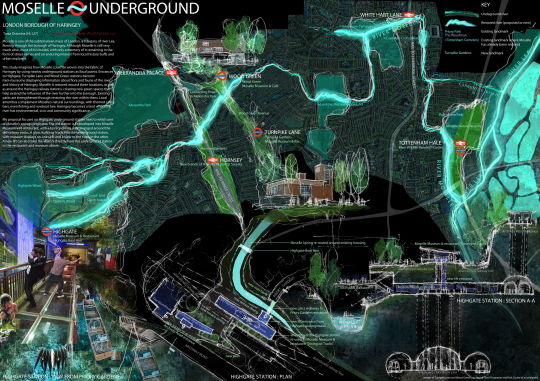
Image: My old poster describing the lost river Moselle in north London and its existing and possible relationships with public spaces and Tube stations. (The original article with a higher resolution image is available here)
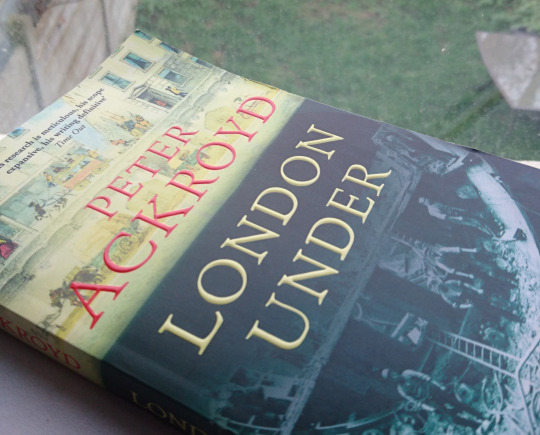
Image: London Under, the brilliant book by Peter Ackroyd, with a large section on London’s lost rivers
In the classroom session that followed, we were urged to recognise that who we are and how we relate to the world depends on what tools we have available, both as users of technology and as designers. Of course, the bias of the researcher, observer and designer is something that traditional HCI is acutely aware of, and often tries to eliminate. Yet, to what extent is it really possible? What if, instead of pretending to be unbiased, the designer dives right in and accepts bias as part of their creative process? As designers, my group is already prejudicing certain choices over others, and my personal experience and interests are already shaping our creative direction. Further, as users of technology, we could expand on the HCI concept of the task-artefact cycle to claim that we are changed by the technology as much as the technology is changed by us. In the context of my earlier thoughts on the multi-layered smart city, this interdependent relationship could be key in how the new layer of smart city technology will slot into the existing historic context of London, with its already existing interdependencies, both overt and hidden.
During the same session, we were considering the role of stories in design. Rather than being stories that are fabricated by the designer (as illustrated by the ivory tower examples from my second blog post), they are instead uncovered through letting in those, whom the design is for. To allow for this letting in to happen, it may be necessary to shake off the traditional user-centred design approach favoured in HCID which, in the words of Daniela Rosner in her book Critical Fabulations, focusses on “individualism, objectivism, solutionism and universalism.” Instead, Rosner offers an alternative approach of “alliances, recuperations, interferences and extensions.” The concept of recuperations in particular stresses the importance of absent narratives: “What histories of practice have been suppressed or elided?” Whose voices are missing? This slotted in with my earlier ponderings on the lost histories that lie under our feet.
The following weekend I attended the William Blake exhibition at Tate Britain. His work, infused with the powerful motifs of underworld and death, deeply moved me and further reinforced my focus on these themes for our project. Blake had lived his entire life in London and had rarely left its bounds, his work ingrained in the context of the eighteenth and nineteenth century London.
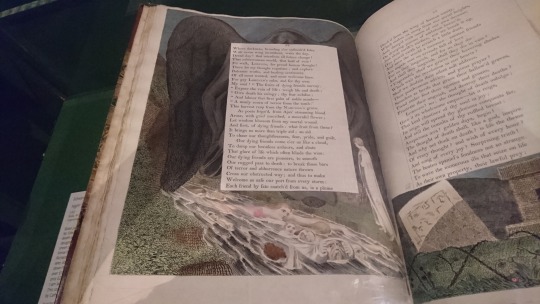
Image: Illustration from the book Complaint, and the consolation, or, night thoughts, 1797, by William Blake. Open at pp.54-5
A very obvious absent narrative haunted me throughout the exhibition - that of Blake’s wife, Catherine. There was a drawing of her at the beginning of the exhibition, alongside a brief piece of text explaining her involvement in Blake’s work, such as engraving, colouring and practical support.

Image: Catherine Blake, c.1805, by William Blake
Another, much more poignant piece of text later on in the exhibition, explained that Blake’s Pilgrim’s Progress was purposefully ignored by scholars for many years because it was known that Catherine had been directly involved in producing the series, and that “her creative and practical influence is only beginning to be fully appreciated.” Catherine’s story resonated with me deeply, making me wonder how much of her absence could be reconstructed at this point in time. Could today’s scholars read between the lines and re-imagine her, in the full depth she deserves, using today’s technology?
The image below is a brief attempt to encapsulate my frame of mind and my preoccupations over that week, in a data visualisation format. I counted the number of times the themes of underworld and death have come up in my personal life over the course of the previous seven days, and then plotted them on a graph, turned upside down to reinforce the effect of its ‘underworld-ness’. Initially spurred by our group discussions, the frequency of these themes ebbed and flowed, taking a ‘deepwater dive’ - 14 mentions of underworld, 14 mentions of death - on the day of the William Blake exhibition.
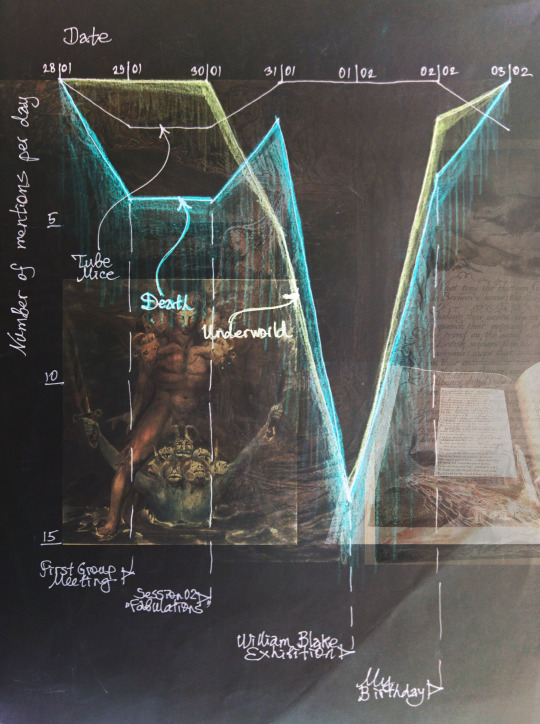
Image: My data visualisation of my previous week’s preoccupations, illustrating the number of times per day I documented the themes of underworld and death.
During our second group meeting, I discovered that some members of my group had been thinking in parallel, getting progressively fascinated by similar subjects. One group member had become engrossed in the subject of digital graveyards: the strange situations that arise when a relationship has come to an end, or when someone has passed away, yet that person’s digital presence is still palpable. I jumped immediately on that idea, not just because it had relevance to my own design thinking so far, but also because the subject resonated with me on a personal level.
So our group talked about how death was a taboo subject in our everyday lives, and how art and literature served as ways to bridge that indescribable void.
We agreed to go our separate ways and observe and document our findings for our third group discussion.
0 notes